初中英语八种时态归纳复习题
初中英语八种时态讲解练习
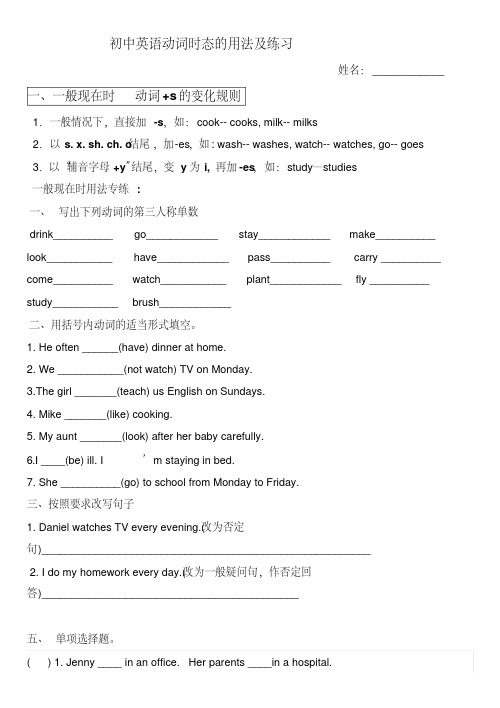
初中英语动词时态的用法及练习姓名:____________ 一、一般现在时动词+s的变化规则1.一般情况下,直接加-s,如:cook-- cooks, milk-- milks2.以s. x. sh. ch. o结尾,加-es,如: wash-- washes, watch-- watches, go-- goes3.以“辅音字母+y”结尾,变y为i, 再加-es,如:study—studies一般现在时用法专练:一、写出下列动词的第三人称单数drink__________ go____________ stay____________ make__________ look___________ have____________ pass__________ carry __________ come__________ watch___________ plant____________ fly __________ study___________ brush____________二、用括号内动词的适当形式填空。
1.He often ______(have) dinner at home.2.We ___________(not watch) TV on Monday.3.The girl _______(teach) us English on Sundays.4. Mike _______(like) cooking.5. My aunt _______(look) after her baby carefully.6.I ____(be) ill. I’m staying in bed.7. She __________(go) to school from Monday to Friday.三、按照要求改写句子1. Daniel watches TV every evening.(改为否定句)_______________________________________________________2. I do my homework every day.(改为一般疑问句,作否定回答)___________________________________________五、单项选择题。
初中英语八大时态用法详解及真题巩固练习

初中英语八大时态用法详解及真题巩固练习一般现在时1. 概念:经常、反复发生的动作或行为及现在的某种状况。
2. 基本结构:①is/am/are;②do/does否定形式:①am/is/are + not ; ②此时态的谓语动词若为行为动词,则在其前加don't,如主语为第三人称单数,则用doesn't,同时还原行为动词。
3. 一般疑问句:①把 is/am/are 动词放于句首;②用助动词do提问,如主语为第三人称单数,则用does,同时,还原行为动词。
4. 用法:1) 经常性或习惯性的动作,常与表示频度的时间状语连用。
例如:I leave home for school at 7 every morning. 每天早上我七点离开家。
2) 客观真理,客观存在,科学事实。
例如:The earth moves around the sun. 地球绕太阳转动。
Shanghai lies in the east of China. 上海位于中国东部。
3) 表示格言或警句。
例如:Pride goes before a fall. 骄者必败。
注意:此用法如果出现在宾语从句中,即使主句是过去时,从句谓语也要用一般现在时。
例如:I knew that the earth goes around the sun when I was little.我小时候就知道地球绕太阳转。
4) 现在时刻的状态、能力、性格、个性。
例如:I don't want so much. 我不要那么多。
Ann writes good English but does not speak well.安英语写得不错,讲的可不行。
5) 一般现在时表示将来含义a. 下列动词 come, go, arrive, leave, start, begin, return 的一般现在时可以表示将来,主要用来表示在时间上已确定或安排好的事情。
初中英语语法八大时态总结及练习题
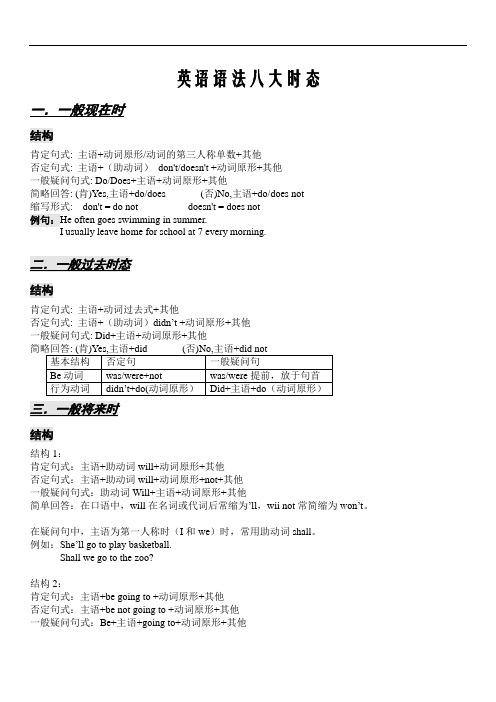
英语语法八大时态一.一般现在时结构肯定句式: 主语+动词原形/动词的第三人称单数+其他否定句式: 主语+(助动词)don't/doesn't +动词原形+其他一般疑问句式: Do/Does+主语+动词原形+其他简略回答: (肯)Yes,主语+do/does (否)No,主语+do/does not缩写形式: don't = do not doesn't = does not例句:He often goes swimming in summer.I usually leave home for school at 7 every morning.二.一般过去时态结构肯定句式: 主语+动词过去式+其他否定句式: 主语+(助动词)didn’t +动词原形+其他一般疑问句式: Did+主语+动词原形+其他基本结构否定句一般疑问句Be动词was/were+not was/were提前,放于句首行为动词didn’t+do(动词原形)Did+主语+do(动词原形)三.一般将来时结构结构1:肯定句式:主语+助动词will+动词原形+其他否定句式:主语+助动词will+动词原形+not+其他一般疑问句式:助动词Will+主语+动词原形+其他简单回答:在口语中,will在名词或代词后常缩为’ll,wii not常简缩为won’t。
在疑问句中,主语为第一人称时(I和we)时,常用助动词shall。
例如:She’ll go to play basketball.Shall we go to the zoo?结构2:肯定句式:主语+be going to +动词原形+其他否定句式:主语+be not going to +动词原形+其他一般疑问句式:Be+主语+going to+动词原形+其他简略回答:(肯)Yes,主语+be (否)No,主语+be not将来时其他表示法1)be going to表示将来表示说话人的打算、计划、安排或根据迹象判断必然或很可能发生的事情。
中考英语八大时态测试题(含答案)
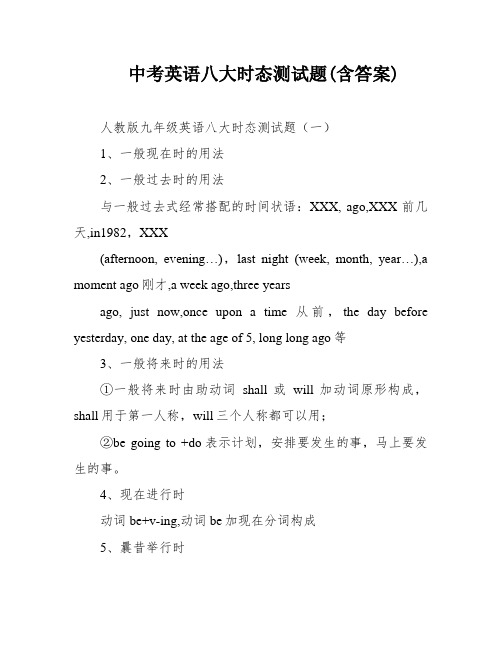
中考英语八大时态测试题(含答案)人教版九年级英语八大时态测试题(一)1、一般现在时的用法2、一般过去时的用法与一般过去式经常搭配的时间状语:XXX, ago,XXX前几天,in1982,XXX(afternoon, evening…),last night (week, month, year…),a moment ago刚才,a week ago,three yearsago, just now,once upon a time从前,the day before yesterday, one day, at the age of 5, long long ago等3、一般将来时的用法①一般将来时由助动词shall或will加动词原形构成,shall用于第一人称,will三个人称都可以用;②be going to +do表示计划,安排要发生的事,马上要发生的事。
4、现在进行时动词be+v-ing,动词be加现在分词构成5、曩昔举行时与过去进行时搭配的时间状语:(just)then那时,当时;XXX在这/那时XXX今世界战书;at nine在九点;last night昨晚;(at)this time XXX在今天这个时分但在很多情形下,没有透露表现工夫的状语,这时候需求经由过程高低文来透露表现。
6、过去将来时构成:一般过去将来时由should或would加动词原形构成,第一人称用should,其他人称用would,第一人称也能够用would.容身于曩昔某一时辰,从曩昔看将要产生的工作,经常使用于宾语从句中。
与曩昔未来时搭配的时间状语:the next day(morning, year…), the following month(week…)等7、现在完成时组成:目前完成时态是由“助动词have(has)+曩昔分词”组成,标记词:for, since, since…ago,yet8、过去完成时实战模仿()1. There _______ XXX.A. XXX()2. --- Who sings best in your class?--- Jenny _______.1XXX done()3. --- _____ the young girl _____ the old man clean his room every day?--- Yes, she does.A. Does; XXX; XXX; helpD. Do; helps()4. --- Can I go to Beijing for my holiday, Dad?--- You can when you _______ a bit older.A. will XXX()5. --- What does Linda often do in the evening?--- She often ____ her homework, but on the evening of March 12 she____TV.A. does; watchesB. is doing; watchedC. does; watchedD. is doing; was watching()6. XXX __around the sun.A. XXX()7. If he _______harder, he will catch up with us soon.A. XXX()8. --- Don’t forget to ask him to write to me.--- I won’t. As soon as he _____, I’ll ask him to write to you.A. XXX coming()9. --- Do you like this silk dress?--- Yes, I do. It _______ so soft and comfortable.A. is XXX felt()10. Oh, it’s you. I’m sorry I _______ know you _______ here.A. don’t; areB. didn’t; XXX’t; XXX’t; were() 11. XXX?2A. XXX() XXX XXX.A. XXX() 13. Some arein the XXX.A. swiming, playingB. swimming, plaiingC. swimming, playingD. swimming, plaing() 14.---Where is Dick?--- Heto the reading-room.A. has XXX() 15. Mark Twain, an American writer,XXX.A. knowsB. is known asC. is known toD. is known for () 16. I hope he will come to see me before XXX.A. XXX left() XXX.A. XXX() 18. I think sheright now.A. XXX readingD. read() 19. ---- Where are the children?---- Theya good time in the garden.A. XXX() 20. ----- Wheremy glasses? I can’t find them.---- Ithem on the bookshelf, XXX.A. you put, putB. you have put, have putC. have you put, putD. did you put, have put3() 21. When the police arrived, the manfor 10 minutes. A. diedB. was deathC. had diedD. had been dead() 22. By the time this talk is over, wea lot about the earth.A. will be XXX have learnt()23. XXX difficulties.A. helpedB. will helpC. helpD. were going to help() 24. ----Have you seen him today? ----Yes, Ihim this morning.A. has XXX() 25. Heworried when he heard this news.A. XXX() 26. XXX.A. XXX do()27. I don’t think that it’s true. He’XXX.A. XXX() 28. Have XXX Farm?A. XXX() 29. XXX?A. has, borrowedB. has, keptC. has, lentD. is, using() 30. Heto do this lessons at eight every evening.A. XXX() 31. XXX.A. are going to hasB. is going to haveC. are havingD. are going to have() XXX.A. XXX4() 33.heon well with his friends this term?A. Does, getsB. Does, getC. Is, gettingD. Is, geting() XXX? I can’t find it.A. XXX() XXX Saturday?A. XXX play() 36. The childrenat school now.A. XXX()XXX stories, but hea TV play these days.A. is writing, is writingB. is writing, writesC. writes, is writingD. writes, writes() 38. He said hethe league(联盟) for two years.A. has joinedB. has been inC. had been inD. joined() 39. XXX garden,she?A. XXX’t() 40. Whatyouto do to keep the room clean?A. do, haveB. does, haveC. did, haveD. are, have() 41. Some flowersby XXX already.A. have been XXX()42. When winter comes, XXX.A. are going toB. willC. will beD. would() 43. Ito the XXX.A. go, goB. am going, goC. go, am goingD. am going, am going() XXX future now,you?A. don’t think, XXX, aren’t5XXX, doD. aren’t thinking, are()45. XXX hehis way.A. would lostB. would loseC. is going toD. shall lose() 46. Weeach other since he left here.A. XXX’t XXX seen() 47. Mr. Smithout for a walk in the park every day.A. XXX go() 48. Hefrom home for a long time.A. has gone awayB. had gone awayC. has leftD. has been away()49. You mustn’t go too high, or youdangerous.A. will beB. areC. would beD. is going to() 50. We have known each other.A. since we were youngB. after we were youngC. when we are youngD. if we are young() 51. XXX work.A. XXX. is going to() 52. How long has this shop?A. be XXX() 53. Mr. Smithhere since he moved to his city.A. had XXX has lived()54. ----Have you read the newspaper?----No, I XXX’t.A. XXX()55. Our knowledge of the universeall the time. 6A. XXX() 56. She won’t go to the XXX.A. XXX()57. XXX.A. has been deadB. was deadC. has diedD. died() 58. Sheto the Great Wall several times.A. goesB. has goneC. wentD. has been() 59. XXX.A. XXX() 60. XXX book.A. XXX()61. Ithe bike for over four years.A. XXX()62. XXX.A. had visitedB. has visitedC. will visitD. would visit() 63. His motherthe Party last year. Shea Party member for a year.A. joined, wasB. has joined, isC. joined, has beenD. has joined, has been() 64. We don’t know if itthe day after tomorrow.A. XXX rain() 65. He said hehis life for his country.A. XXX givenD. would give()66. XXX.A. goB. goesC. wentD. is going() 67. Look, the XXX.7A. XXX() 68. Hein this school in 1958.A. XXX() XXX.A. will XXX() 70. XXX work in two days.A. had XXX finish()71. By the end of last week, XXX.A. would learnB. have learnedC. had learnedD. were learning () 72. When he left, his mother.A. XXX() 73. We’ll go to play with snow if XXX.A. XXX() XXX.A. XXX() 75. The trainwhen we got to the XXX.A. has just leftB. had just leftC. leavesD. left() 76. Dr Smith is not at home. Heto work.A. has goneB. has beenC. had beenD. had gone() 77. That man knows a lot about New York. I heard hebefore.A. had gone to the cityB. had been in thereC. had been thereD. had been New York() 78. The artistto Europe. He is there now.A. has goneB. has beenC. had goneD. had been8() 79. Miss Brown said XXX China before.A. has, goneB. has, beenC. had, goneD. had, been() XXX?A. is, doingB. was, doingC. did, doD. had, done() 81. Ito see the film because I have XXX.A. XXX’t gone() 82. The students will have a football match if XXX.A. will beB. would beC. wasD. is() 83. She asked me if Ithe story before.A. have readB. had readC. would readD. will read() XXX?A. are, doingB. did, doC. have, doneD. were, doing() 85. You can’t see him now because XXX.A. XXX having() XXX.A. XXX’t XXX() 87. Li Ping will visit the Great Wall as soon as hefree.A. will beB. isC. wasD. has been() 88. One day when Ithe post office Imy uncle.A. pass, seeB. was passing, sawC. passed, sawD. pass, saw () XXX.A. said, will makeB. said, madeC. said, had madeD. said, make() XXX.9A. are, haveB. were, haveC. were, to haveD. are, having () XXX.A. XXX. take a walkD. is taking a walk() 92. Mary is seven years old. Sheeight next year.A. XXX be() 93. A table and many XXX.A. wasB. wereC. are beingD. was being() 94. I’ll go with you as soon as Imy work.A. will XXX() 95. Treesgreen in spring.A. XXX XXX() 96. XXX Iin bed all day because I had a fever.A. XXX() 97. Hello, Mike. It’s you. Iyouin Beijing. How long have you been here?A. don’t know, XXX’t know, areC. XXX, areD. XXX’t know, were() 98. A: Whenagain? B: When he. I’ll let you know.A. he comes, comesB. will be come, will comeC. he comes, will comeD. will he come, comes() 99. The last bus. I had to walk home.A. had goneB. have goneC. wentD. has gone() 100. A: Are you making cakes?B:.A. Yes, I doB. Yes, I amC. Yes, I’mD. Yes, I’m making10()101. ----What time?----My watch.A. it is, stoppedB. is it, has stoppedC. it is, has stoppedD. is it, is stopping() 102. Whaton Sunday?A. does he sometimes doB. is he often doingC. has he doneD. is usually he do()XXX night?A. XXX, XXX, watchingC. XXX, XXX, XXX() 104. That Japanese knowsthe Salt Lake City. I XXX.A. a lot of, had been thereB. a lot about, had been thereC. lot, had been thereD. a lot of, had gone there() 105. As soon as we saw his face, XXX.A. XXX, wasB. know, wereC. know, wasD. know, were11参考答案1-10:DCABCDBCBC11-20:ABCCCBBCAC21-30:DDDDBDBDBD31-40:DCBCABCBAA。
初中英语八大时态全套精讲及练习题(附答案)
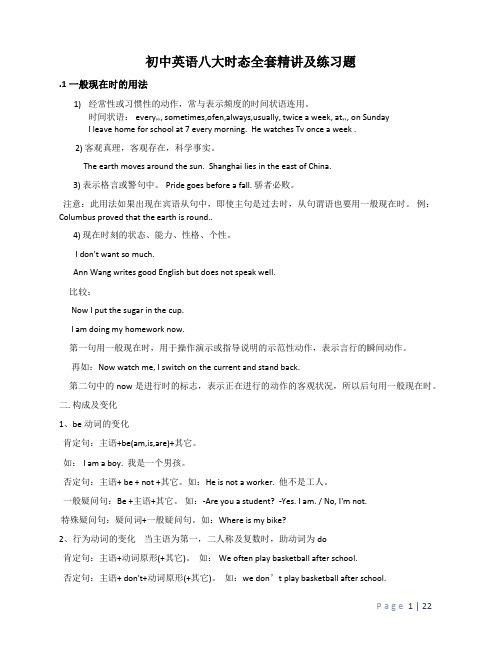
初中英语八大时态全套精讲及练习题.1 一般现在时的用法1)经常性或习惯性的动作,常与表示频度的时间状语连用。
时间状语: every…, sometimes,ofen,always,usually, twice a week, at…, on SundayI leave home for school at 7 every morning. He watches Tv once a week .2) 客观真理,客观存在,科学事实。
The earth moves around the sun. Shanghai lies in the east of China.3) 表示格言或警句中。
Pride goes before a fall. 骄者必败。
注意:此用法如果出现在宾语从句中,即使主句是过去时,从句谓语也要用一般现在时。
例:Columbus proved that the earth is round..4) 现在时刻的状态、能力、性格、个性。
I don't want so much.Ann Wang writes good English but does not speak well.比较:Now I put the sugar in the cup.I am doing my homework now.第一句用一般现在时,用于操作演示或指导说明的示范性动作,表示言行的瞬间动作。
再如:Now watch me, I switch on the current and stand back.第二句中的now是进行时的标志,表示正在进行的动作的客观状况,所以后句用一般现在时。
二. 构成及变化1、be动词的变化肯定句:主语+be(am,is,are)+其它。
如: I am a boy. 我是一个男孩。
否定句:主语+ be + not +其它。
如:He is not a worker. 他不是工人。
100道题!初中英语八大时态专项练习题(含答案)
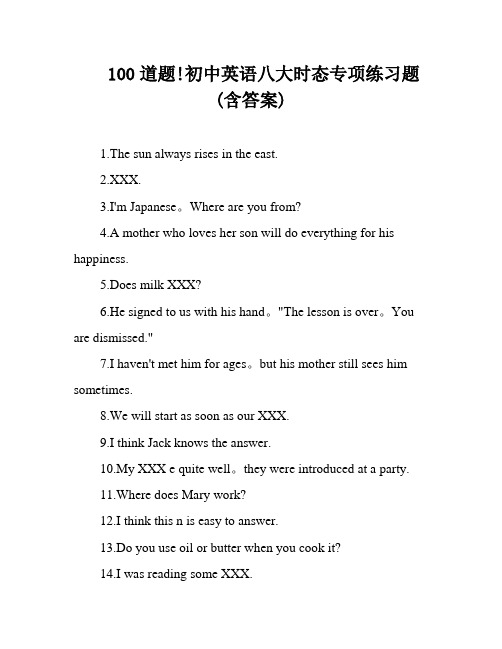
100道题!初中英语八大时态专项练习题(含答案)1.The sun always rises in the east.2.XXX.3.I'm Japanese。
Where are you from?4.A mother who loves her son will do everything for his happiness.5.Does milk XXX?6.He signed to us with his hand。
"The lesson is over。
You are dismissed."7.I haven't met him for ages。
but his mother still sees him sometimes.8.We will start as soon as our XXX.9.I think Jack knows the answer.10.My XXX e quite well。
they were introduced at a party.11.Where does Mary work?12.I think this n is easy to answer.13.Do you use oil or butter when you cook it?14.I was reading some XXX.15.Now he is writing a book about New York。
I don't think he will finish it.16.XXX。
but now he is not XXX.17.XXX。
she is washing it now.18.XXX to the。
but at the present moment he is XXX.19.How long ago were you playing with soldiers?Note: There were no us problematic paragraphs to delete in this article.)Rewritten:11.Can you tell me where Mary is employed?12.XXX.13.When cooking。
初中英语八种时态详解及练习
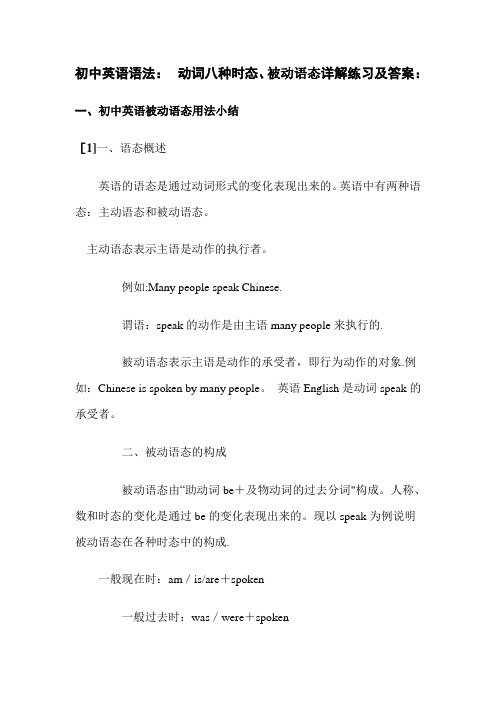
初中英语语法:动词八种时态、被动语态详解练习及答案:一、初中英语被动语态用法小结[1]一、语态概述英语的语态是通过动词形式的变化表现出来的。
英语中有两种语态:主动语态和被动语态。
主动语态表示主语是动作的执行者。
例如:Many people speak Chinese.谓语:speak的动作是由主语many people来执行的.被动语态表示主语是动作的承受者,即行为动作的对象.例如:Chinese is spoken by many people。
英语English是动词speak的承受者。
二、被动语态的构成被动语态由“助动词be+及物动词的过去分词"构成。
人称、数和时态的变化是通过be的变化表现出来的。
现以speak为例说明被动语态在各种时态中的构成.一般现在时:am/is/are+spoken一般过去时:was/were+spoken一般将来时:will/shall be+spoken现在进行时:am/is/are being+spoken过去进行时:was/were being+spoken现在完成时:have/has been+spoken过去完成时:had been + spoken三、被动语态的用法(1)不知道或没有必要说明动作的执行者是谁。
例如:Some new computers were stolen last night.一些新电脑在昨晚被盗了.(不知道电脑是谁偷的)This bridge was founded in 1981。
这座桥竣工于1981年。
(2)强调动作的承受者,而不强调动作的执行者。
例如:The glass was broken by Mike.玻璃杯是迈克打破的。
This book was written by him.这本书是他写的.Your homework must be finished on time.你们的家庭作业必须及时完成。
四、主动语态变被动语态的方法(1)把主动语态的宾语变为被动语态的主语。
(完整版)初中英语八大时态练习题(含答案)

(完整版)初中英语八大时态练习题(含答案) -CAL-FENGHAI-(2020YEAR-YICAI)_JINGBIAN初中英语八大时态练习题1.I will tell him as soon as he _____ backA. comeB. comesC. will comeD. came2. Mary _____ on shoes when she ____ them.A. tries…buysB. tries… buiesC. trys… buysD. trys… buies3. The girl often ______ cold when she ______.A. cathcsdancesB. catches dancesC. catchsdanceesD. catches dancee4. _____ he ____ himself there No, I don't think so.A. DoenjoyB. Does enjoiesC. Does enjoysD. Doesenjoy5. _____ your teacher ____ from them very often Certainly.A. DohearB. DoeshearC. Do receiveD. receive6. _____ your mother _____ some cleaning on SundaysA. DoesdoesB. DodoesC. DoesdoD. Do do7. _____ Tom _____to work hard to help his family Yes, he _____.A. Has xdoesB. HasxdoesC. DoeshashasD. Does havedoes8. Which teacher _____ lessons to you every dayA. does givesB. does giveC. do giveD. gives9. Smith does not go fishing on weekdays, ____ _____ , he does.A. does heNoB. does heYesC. doesn't heNoD. doesn't heYes10.Mr Black often _____ fishing on Sundays, _____ heA. goesdoesn'tB. goesisn'tC. doesn't godoesD. doesn't gois11.He usually _____ TV on Sunday evening.A. watchB. watchesC. watchingD. is watching12. We'll go to play with snow if it ______ tomorrow.A. snowB. snowsC. will snowD. snowed13. Neither I nor he ______ French.A. speakB. doesn't speakC. speaksD. doesn't speak14. Nobody ______ how to run this machines.A . know B. have known C. knows D. is knowing15. The Young Pioneer _____ water for the old man every day.A. carryB. bringC. takesD. carries16. Some are ______ in the river and some are ______ games.A. swimming playingB. swimmingplaiingC. swimming I playingD. swimmingplaing17. Look ! The boy students are _____ football while the girls are _____ .A. playing danceB. playing dancingC. play dancingD. play dance18. He _____ to do his lessons at eight every evening.A. is beginningB. is beginningC. beginD. begins19. _____ he _____ on well with his friends this termA. DoesgetsB. DoesgetC. IsgettingD. Isgeting20. Mr Smith _____ short stories, but he ____ a TV play these days.A. is writingis writingB. is writing writesC. writes is writingD. writes writes参考答案:1—5 BABDB 6—10 CDDBA 11—15 BBCCD 16—20 CBDCC21. I _____ to the cinema. I ______ there every Sunday.A. go…goB. am going… goC. go… am goingD. am going…am going22. Look, they______ a good time, ____ theyA. have…doB. have…don'tC. are having…areD. are having aren't23. You ______ about the future now, ______ youA. don't thinkdon'tB. aren't thinking aren'tC. don't think doD. aren't thinking are24. She always ______ something whenever she ______.A .studiedplayed B. studiedplaiedC.. studiedplaiedD. studied played25. He often _____ late in the forest. It _____ me very much.,A. stayedworriedB. staied worriedC. stayedworryedD. staied worried26. I ______that the boy _____ with no tears in his eyes.A. noticed cryedB. noticed criedC. noticedcriedD. noticed cryed27. We _____the floor and _____ all the windows.A. mopped cleannedB. moped cleanedC. moppedcleanedD. moped cleaned28. When I _____ the Children's Palace, the children _____ with joy.A. visited jumppedB. visited jumpedC. visited jumpedD. visited jumpped29. ______ a sports meet last Sunday Yes , they ______.A. Did they have didB. Did they have hadC. Had they hadD. Had they did30. ____ you _____out for a walk after supper Yes, I ______.A. DidwentwentB. Did go wentC. Did went didD. Did go did31. _____ Jack _____ on with his work or ______ to have a restA. Did went stoppedB. Did go stopC. Did went stopD. Did go stopped32. You gave them a talk two days ago, _____you Yes, I ______.A. did didB. did gaveC. didn't didD. didn't gave33. ____ your brother _____ a letter to My father.A. Who wroteB. WhatwroteC. Who didwriteD. What did write34. They _____ about the TV news then in the sitting-room. They often ____ such talksA. talkedhadB. talkhaveC. were talkinghadD. are talkinghave35. He ______ some cooking at that time, so _____ me.A. did heardB. did didn't hearC. was doing heardD. was doing didn't hear36. " _____ you angry then " "They_ too much noise."A. Arewere makingB. Werewere makingC. AremadeD. Were made37. This time yesterday Jack _____ his, bike. He _____ TV.A. repaired didn't watchB. was repairing watchedC. repaired watchedD. was repairing wasn't watching38. We _____ for Tom at ten last Sunday. He often kept us ______.A. were waiting waitingB. were waiting waitC. waited waitingD. waited wait39. When you _____ at the door, I _____ some washing.A. knocked didB. was knocking didC. knocked was doingD. knock am doing40. The boy_____ English on the radio when I _____ his door.A. learned was openingB. was learning openedC. learned openedD. is learning open参考答案:21-25 BDDDA 26—30 BCBAD 31—35 BCCCD 36—40 BDACB41. When they______ through the forest, a bear _____ at them.A. walked… was comingB. were walking… cameC. were talking… comesD. walk… is coming42. A young man _____ her while she _____ her work .A. watched was finishingB. was watching finishedC. watched finishedD. was watching was finishing43. While mother _____ some washing, I ______ a kite for Kack.A. did madeB. was doing madeC. was doing was makingD. did was making44. I _____ myself French from 7 to 9 yesterday morning. I _____ to work.A. was teaching didn't goB. taught didn't goC. was teaching wentD. taught went45. He _____ a model plane when I came to see him.A. makesB. is makingC. was makingD. made46. I ______ a letter at nine last night.A. is writingB. was writingC. wroteD. is writing47. The teacher_____ (give) us a history lesson when Tom walked into the classroom.A. gaveB. is givingC. was givenD. was giving48. There will be a football match in two days, that is _______.A. last SundayB. next SundayC. every SundayD. this Sunday49. We ______ class meeting this November.A. hadB. haveC. will haveD. are having50. He ______ in his garden every morning next year.A. will workB. worksC. workedD. is working51. Be careful. The train ______.A. will comeB.C. comesD. is coming52. Look at those clouds. It _____ soon, I'm afraid.A. is going to rainB. is rainingC. will rainD. won't rain53. The radio says it ______ the day after tomorrow.A. is going to snowB. is snowingC. will snowD. snows54. _____ he _____ some shopping tomorrow afternoonA. WilldoesB. is going to doC. isdoingD. Shall do55. What day _____ it ______ tomorrow Wednesday.A. is going to beB. willbeC. shallbeD. doesbe56. The boy _______ sixteen years old next year.A. is going to beB. is growing to beC. will beD. is57. _____ you ____ me up at six, pleaseA. Aregoing to wakeB. ArewakingC. WillwakeD. Dowake58. If he ______ to college, he _____ a lot more.A. will gowill learnB. will gois going to learnC. is going is going to learnD. goes will learn59. When she _____ next time ,l ______ her everything.A. is going to comeshall tellB. will comeshall tellC. comeswill tellD. comewill tell60. What day ____ it ____ tomorrow It ____Tuesday.A. is…going to be… isB. will…be…willC. is…going to be…is goingD. will be…will be 参考答案:41-45 BDCAC 46—50 BDDCA 51—55 DACBB 56—60 CCDCD。
- 1、下载文档前请自行甄别文档内容的完整性,平台不提供额外的编辑、内容补充、找答案等附加服务。
- 2、"仅部分预览"的文档,不可在线预览部分如存在完整性等问题,可反馈申请退款(可完整预览的文档不适用该条件!)。
- 3、如文档侵犯您的权益,请联系客服反馈,我们会尽快为您处理(人工客服工作时间:9:00-18:30)。
初中英语八种时态归纳复习时态是英语学习中一个至关重要的内容,广大初中学生在实际运用时,往往对时态总是倍感棘手,下面我们就归纳复习一下這几种时态。
一、一般现在时:概念:经常、反复发生的动作或行为及现在的某种状况。
时间状语:always, usually, often, sometimes, every week (day, year, month…), once a week, on Sundays, etc.基本结构:①be动词;②行为动词否定形式:①am/is/are+not;②此时态的谓语动词若为行为动词,则在其前加don't,如主语为第三人称单数,则用doesn't,同时还原行为动词。
一般疑问句:①把be动词放于句首;②用助动词do提问,如主语为第三人称单数,则用does,同时,还原行为动词。
二、一般过去时:概念:过去某个时间里发生的动作或状态;过去习惯性、经常性的动作、行为。
时间状语:ago, yesterday, the day before yesterday, last week(year, night, month…), in 1989, just now, at the age of 5, one day, long long ago, once upon a time, etc.基本结构:①be动词;②行为动词否定形式:①was/were+not; ②在行为动词前加didn't,同时还原行为动词。
一般疑问句:①was或were放于句首;②用助动词do的过去式did 提问,同时还原行为动词。
三、现在进行时:概念:表示现阶段或说话时正在进行的动作及行为。
时间状语:now, at this time, these days, etc.基本结构:am/is/are+doing否定形式:am/is/are+not+doing.一般疑问句:把be动词放于句首。
四、过去进行时:概念:表示过去某段时间或某一时刻正在发生或进行的行为或动作。
时间状语:at this time yesterday, at that time或when引导的谓语动词是一般过去时的时间状语等。
基本结构:was/were+doing否定形式:was/were + not + doing.一般疑问句:把was或were放于句首。
五、现在完成时:概念:过去发生或已经完成的动作对现在造成的影响或结果,或从过去已经开始,持续到现在的动作或状态。
时间状语:recently, lately, since…for…,in the past few years, etc.基本结构:have/has + done否定形式:have/has + not +d one.一般疑问句:have或has。
六、过去完成时:概念:以过去某个时间为标准,在此以前发生的动作或行为,或在过去某动作之前完成的行为,即“过去的过去”。
时间状语:before, by the end of la st year(term, month…),etc.基本结构:had + done.否定形式:had + not + done.一般疑问句:had放于句首。
七、一般将来时:概念:表示将要发生的动作或存在的状态及打算、计划或准备做某事。
时间状语:tomorrow, next day(week, month, year…),soon, in a few minutes, by…,the day after tomorrow, etc.基本结构:①am/is/are/going to + do;②will/shall + do.否定形式:①was/were + not; ②在行为动词前加didn't,同时还原行为动词。
一般疑问句:①be放于句首;②will/shall提到句首。
八、过去将来时:概念:立足于过去某一时刻,从过去看将来,常用于宾语从句中。
时间状语:the next day(morning, year…),the following month(week…),etc.基本结构:①was/were/going to + do;②would/should + do.否定形式:①was/were/not + going to + do;②would/should + not + do.一般疑问句:①was或were放于句首;②would/should 提到句首。
Ⅱ. 几种常見时态的相互轉换英语中的几种时态在一定情况下可以互相轉换,以下是几种常見的轉换形式:一、一般过去时与现在完成时的轉换在现在完成时中,延续性动词能与表示一段时间的状语連用,瞬间动词却不能。
但是,可用別的表达方式:①瞬间动词用于“一段时间+ ago”的一般过去时的句型中;②瞬间动词可改成与之相对應的延续性动词及短语,与一段时间連用;③瞬间动词用于“It is + 一段时间 + since + 一般过去时”的句型中,表示“自从……以来有……时间”的意思,主句一般用it is来代替It has been;④瞬间动词用于“Some time has passed since + 一般过去时”的句型中。
请看:A. He joined the League two years ago.B. He has been in the League for two years.C. It is two years since he joined the League.D. Two years has passed since he joined the League.二、一般现在时与现在进行时的轉换在一般现在时中,at加上名词表示“处于某种状态”,如at work(在工作), at school(上学、上课)等。
此短语可与进行时态轉换。
请看:Peter is at work, but Mike is at play.Peter is working, but Mike is playing.三、现在进行时与一般将来时的轉换在现在进行时态中go, come, leave, start, arrive等动词常与表示将来的时间状语連用表示将要发生的动作。
如:I am coming, Mum! 意为“我就来,妈妈!”请看:The train is leaving soon. The train will leave soon.四、“be going to+动词原形”与“will(shall)+动词原形”结构的轉换“be going to+动词原形”、表示打算、计划要做的事;将来时“will(shall)+动词原形”结构在书面语中,当主语为第一人称时,常用助动词shall。
在口语中,所有人称都可以用will。
请看:We are going to visit the Great Wall next Sunday.We shall visit the Great Wall next Sunday一般现在时1. He often ________(have) dinner at home.2. Daniel and Tommy _______(be) in Class One.3. We _______(not watch) TV on Monday.4. Nick _______(not go) to the zoo on Sunday.5. ______ they ________(like) the World Cup?6. What _______they often _______(do) on Saturdays?7. _______ your parents _______(read) newspapers every day?8. The girl _______(teach) us English on Sundays.9. She and I ________(take) a walk together every evening.10. There ________(be) some water in the bottle.11. Mike _______(like) cooking.12. They _______(have) the same hobby.13. My aunt _______(look) after her baby carefully.14. You always _______(do) your homework well.15. I _______(be) ill. I’m staying in bed.一般过去时1.Tom and Mary ___________ (come) to China last month.2. Mike ___________(not go) to be d until 12 o’clock last night. So he ____ (get ) up late.3. Mary __________ (read) English yesterday morning.4. There _________ (be) no one here a moment ago.5. I ___________ (call) Mike this morning.6. I listened but ___________ (hear) nothing.7. Tom ___________ (begin) to learn Chinese last year.8. Last week we _________ (pick) many apples on the farm.9. My mother ________________ (not do) housework yesterday.10. She watches TV every evening. But she ____________ (not watch) TV last night. 11.________ your father ________ ( go ) to work every day last year?12.--What time _______ you _______ (get) to Beijing yesterday?--We __________ (get) to Beijing at 9:00 in the evening.13. What __________ (make) him cry (哭) just now?一般将来时( ) 1. There __________ a meeting tomorrow afternoon.A. will be going toB. will going to beC. is going to beD. will go to be ( ) 2. Charlie ________ here next month.A. isn’t workingB. doesn’t workingC. isn’t going to workingD. won’t work ( ) 3. He ________ very busy this week, he ________ free next week.A. will be; isB. is; isC. will be; will beD. is; will be( ) 4. There ________ a dolphin show in the zoo tomorrow evening.A. wasB. is going to haveC. will haveD. is going to be ( ) 5. –_____ you _____ free tomorrow? – No. I ________ free the day after tomorrow.A. Are; going to; willB. Are; going to be; willC. Are; going to; will beD. Are; going to be; will be( ) 6. Mother ________ me a nice present on my next birthday.A. will givesB. will giveC. givesD. give( ) 7. – Shall I buy a cup of tea for you?–________. (不,不要。
